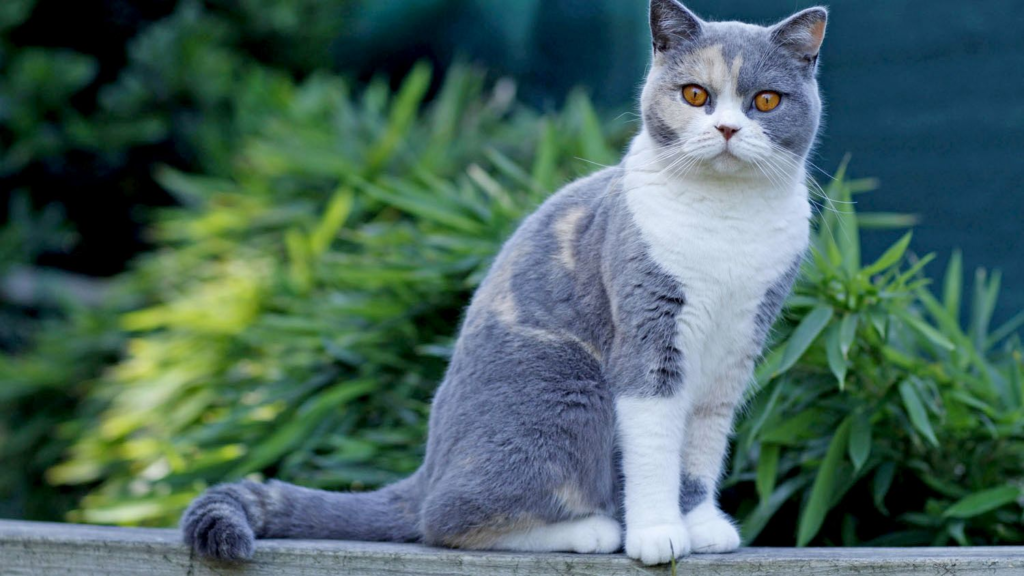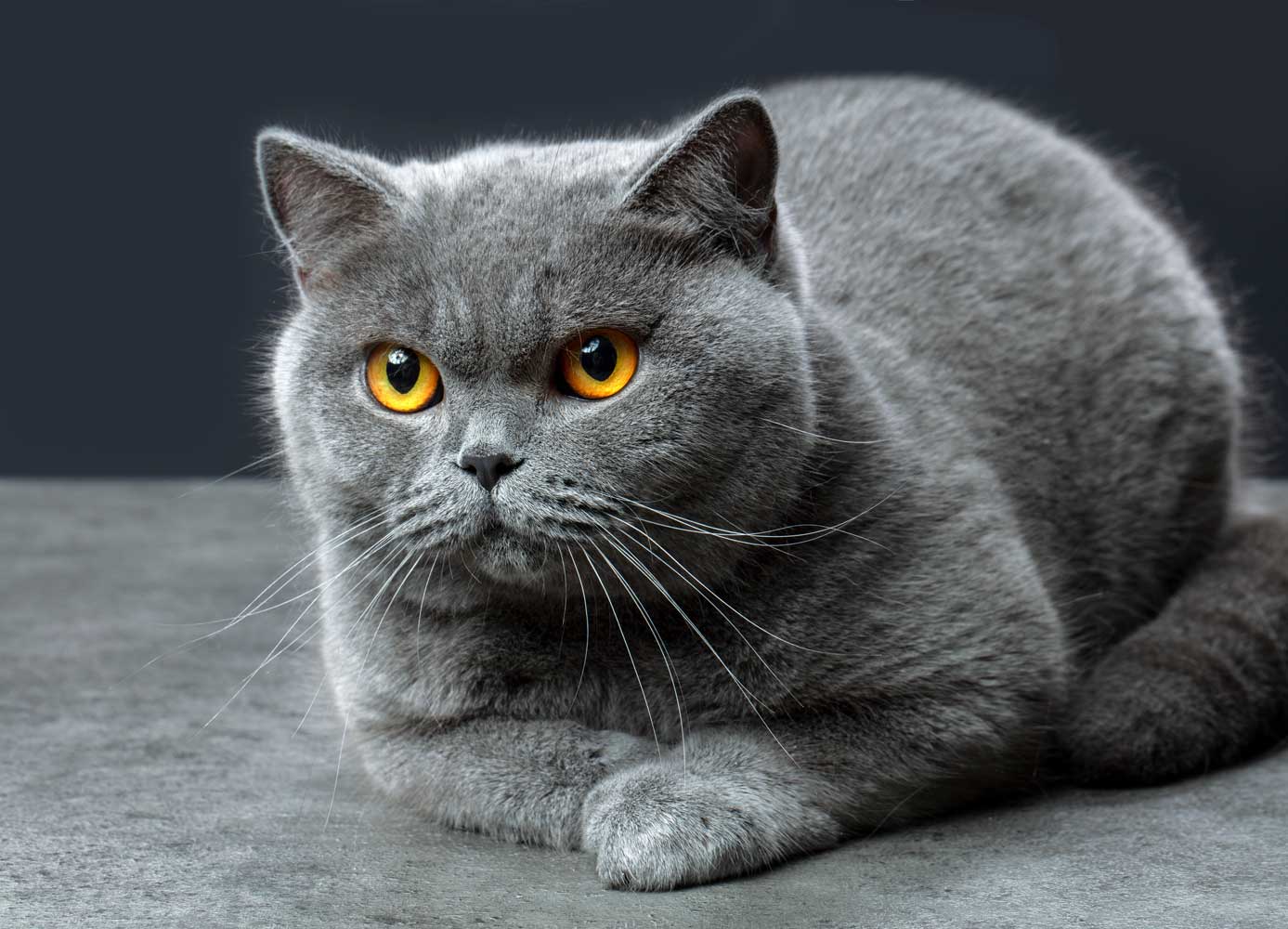Overview
The British Shorthair is a beautiful and charming cat breed known for its round face, dense coat, and calm nature. This cat is one of the oldest and most popular breeds in the world, loved by many for its gentle personality and plush, teddy bear-like appearance. The British Shorthair is a perfect pet for families, as it is friendly, easygoing, and enjoys being around people. These cats are also very adaptable, making them a great fit for various living situations, whether in a small apartment or a large house.
One of the most appealing aspects of the British Shorthair is its low-maintenance nature. These cats are independent and do not demand constant attention, which makes them a good choice for busy families or individuals. They are happy to entertain themselves and enjoy quiet time as much as they enjoy playing and interacting with their owners. British Shorthairs are known for being very patient and are often good with children and other pets.
While the British Shorthair is calm and composed, it still has a playful side. These cats enjoy playing with toys and engaging in gentle games, but they are not overly energetic. They prefer to lounge and observe their surroundings rather than run around or climb high places. This makes them ideal companions for people who prefer a relaxed and peaceful home environment. With their affectionate nature and charming looks, British Shorthairs make a delightful addition to any household.
Characteristics
The British Shorthair is a medium to large-sized cat with a solid and muscular build. One of the most distinctive features of this breed is its round face with chubby cheeks, giving it a sweet and innocent expression. The eyes of the British Shorthair are large and round, usually in shades of gold, copper, or blue, depending on the coat color. The ears are small and rounded at the tips, and the nose is short and broad.
You can also visit our other article: biowikilab
The coat of the British Shorthair is another key characteristic that sets this breed apart. It is short, dense, and plush, with a texture that feels like velvet. The coat can come in various colors and patterns, but the most common and iconic is the solid blue-gray color, often referred to as “British Blue.” Other colors include black, white, red, cream, and more, with patterns such as tabby, tortoiseshell, and bi-color.
In terms of personality, British Shorthairs are known for being calm, friendly, and easygoing. They are not overly demanding and are content to be near their owners without being clingy. These cats are affectionate but not overly so; they enjoy being petted and spending time with their family but are also happy to spend time alone. Their laid-back nature makes them excellent companions for people of all ages, including families with young children or elderly individuals.
History
The history of the British Shorthair is long and fascinating, with roots tracing back to ancient Rome. The ancestors of the British Shorthair were brought to Britain by the Romans, who valued these cats for their hunting skills and ability to keep homes free of rodents. Over time, these cats bred with the local wildcat population, leading to the development of a strong and resilient breed that adapted well to the British climate.

By the 19th century, the British Shorthair had become a distinct breed, recognized for its unique characteristics and charming appearance. During this time, the breed was exhibited at some of the earliest cat shows in the world, where it quickly gained popularity. The breed’s development was carefully managed, with breeders working to maintain its distinctive round face, dense coat, and sturdy build. The British Shorthair was officially recognized by major cat registries, solidifying its place as one of the world’s most beloved breeds.
However, the breed faced challenges during the World Wars, when many cats, including British Shorthairs, faced significant population declines. After the wars, dedicated breeders worked hard to revive the breed, sometimes outcrossing with other breeds like the Persian to restore the British Shorthair’s numbers and characteristics. Today, the British Shorthair is one of the most popular cat breeds globally, cherished for its history, appearance, and endearing personality.
Colorpoint Shorthair Care
Taking care of a British Shorthair is relatively straightforward, thanks to their easygoing nature and low-maintenance coat. However, like all pets, they require regular attention and care to keep them healthy and happy. One of the most important aspects of caring for a British Shorthair is ensuring they have a balanced diet. These cats are prone to obesity, so it’s important to monitor their food intake and provide them with a diet rich in protein and low in fat.
Grooming is another essential part of caring for a British Shorthair. Although their coat is short, it is dense and plush, so it benefits from regular brushing to remove loose hair and reduce shedding. Brushing your British Shorthair once or twice a week should be sufficient to keep their coat in good condition. Additionally, regular grooming sessions help strengthen the bond between you and your cat.
Exercise and mental stimulation are also important for the well-being of your British Shorthair. While these cats are not overly active, they still enjoy playing with toys and engaging in gentle games. Providing a variety of toys and activities can help keep your cat mentally stimulated and physically active. It’s also important to ensure they have a comfortable and safe environment, with plenty of places to rest and observe their surroundings. Regular veterinary check-ups are also crucial to monitor their health and catch any potential issues early.
Colorpoint Shorthair Health Problems
The British Shorthair is generally a healthy breed, but like all cats, they can be prone to certain health issues. One common problem in British Shorthairs is obesity, which can lead to other health complications such as diabetes, heart disease, and joint problems. To prevent obesity, it’s important to monitor their diet and ensure they get regular exercise, even if it’s just gentle play or interactive toys.
Another health issue that can affect British Shorthairs is hypertrophic cardiomyopathy (HCM), a heart condition that causes the walls of the heart to thicken, making it difficult for the heart to pump blood effectively. HCM is a hereditary condition, so if you’re considering getting a British Shorthair, it’s a good idea to ask the breeder if the parents have been screened for this condition. Regular veterinary check-ups can help catch signs of HCM early, allowing for better management of the condition.
Dental health is also important for British Shorthairs. These cats can be prone to dental issues like gingivitis and periodontal disease if their teeth are not properly cared for. Regular brushing of your cat’s teeth and providing dental treats or toys can help keep their teeth and gums healthy. Additionally, it’s important to keep an eye on your cat’s overall health and behavior, and consult your vet if you notice any changes or signs of discomfort.
Colorpoint Shorthair Appearance
The British Shorthair is one of the most easily recognizable cat breeds, thanks to its distinct appearance. These cats have a robust and muscular build, with a broad chest, strong legs, and a thick tail. Their face is round and full, with chubby cheeks that give them a sweet, teddy bear-like expression. The eyes are large, round, and expressive, often in shades of gold or copper, though some may have blue or green eyes depending on their coat color.
One of the standout features of the British Shorthair is its dense, plush coat. The fur is short but incredibly thick, giving the cat a soft, velvety texture that is very pleasant to the touch. The coat comes in a wide variety of colors and patterns, with the solid blue-gray “British Blue” being the most iconic and popular. Other common colors include black, white, red, cream, and silver, as well as various patterns like tabby, tortoiseshell, and bi-color.
The overall appearance of the British Shorthair is one of strength and sturdiness, balanced with an endearing and gentle expression. Their rounded features and plush coat make them look cuddly and approachable, while their solid build gives them a sense of stability and confidence. This combination of looks and personality makes the British Shorthair a truly unique and appealing breed, beloved by cat enthusiasts around the world.
Colorpoint Shorthair Diet and Nutrition
A healthy diet is essential for the well-being of your British Shorthair. These cats need a balanced diet that provides all the necessary nutrients to keep them healthy and active. Because British Shorthairs are prone to obesity, it’s important to monitor their food intake and choose high-quality cat food that is rich in protein and low in fat. Protein is crucial for maintaining their muscle mass, while controlled fat intake helps prevent weight gain.

When feeding your British Shorthair, it’s important to provide portion-controlled meals rather than leaving food out all day. This helps prevent overeating and allows you to monitor how much your cat is eating. You can feed your British Shorthair a combination of wet and dry cat food to ensure they get the right balance of nutrients and hydration. Wet food can be particularly beneficial as it provides additional moisture, which is important for cats’ overall health.
In addition to a balanced diet, make sure your British Shorthair has access to fresh water at all times. Hydration is important for their kidney health and helps prevent urinary issues. Avoid giving your cat human food or treats that are high in fat or sugar, as these can contribute to weight gain and other health problems. By providing a nutritious diet and monitoring their weight, you can help ensure your British Shorthair stays healthy and happy.
Where to Adopt or Buy
If you’re considering adding a British Shorthair to your family, it’s important to choose a reputable source, whether you’re adopting from a shelter or buying from a breeder. Adopting a British Shorthair from a shelter or rescue organization is a wonderful option, as it gives a cat in need a loving home. Many British Shorthairs end up in shelters for various reasons, and adopting one can be a rewarding experience.
If you prefer to buy a British Shorthair from a breeder, make sure to do thorough research to find a responsible breeder who prioritizes the health and well-being of their cats. A reputable breeder will provide you with health clearances for the kitten’s parents, showing that they have been screened for common genetic conditions like hypertrophic cardiomyopathy (HCM). They should also be open to answering any questions you have and allow you to visit their facility to see how the cats are raised.
Before bringing a British Shorthair home, consider whether you can meet their needs and provide a stable, loving environment. These cats are known for their calm and gentle nature, making them a great fit for various households. Whether you choose to adopt or buy, bringing a British Shorthair into your home is a decision that requires careful consideration and commitment to their lifelong care.
Price and Cost
The cost of a British Shorthair can vary depending on several factors, including the cat’s pedigree, color, and where you live. On average, buying a British Shorthair from a reputable breeder can cost anywhere from $800 to $2,000 or more. Cats with champion bloodlines or rare colors may be at the higher end of this price range. It’s important to remember that the initial cost of purchasing the cat is just the beginning; there are ongoing expenses to consider as well.
In addition to the purchase price, you’ll need to budget for initial costs such as vaccinations, spaying or neutering, and basic supplies like a litter box, food bowls, toys, and a scratching post. Regular veterinary care, including annual check-ups, vaccinations, and dental care, is also an important ongoing cost. Pet insurance can be a wise investment to help cover unexpected medical expenses.
If you’re adopting a British Shorthair from a shelter or rescue organization, the cost will typically be lower, usually ranging from $50 to $200. Adoption fees often include initial veterinary care, such as vaccinations and spaying or neutering, which can save you money. Whether you choose to adopt or buy, it’s important to be prepared for the financial commitment of caring for a British Shorthair throughout their life.
Colorpoint Shorthair Pros and Cons
Pros:
- Friendly and calm nature, making them great companions for families.
- Low-maintenance grooming needs with their short, dense coat.
- Adaptable and easygoing, fitting well into various living situations.
- Not overly demanding for attention, content with spending time alone.
- Good with children and other pets due to their patient and gentle temperament.
Cons:
- Prone to obesity, requiring careful monitoring of diet and exercise.
- May be susceptible to hereditary health issues like hypertrophic cardiomyopathy (HCM).
- Can be less active and playful compared to other cat breeds, which might not suit all households.
- Higher initial cost if purchasing from a breeder, especially for pedigree or rare color cats.
- May require regular dental care and monitoring to prevent dental issues.

Interesting Facts
- The British Shorthair is one of the oldest cat breeds in the world, with a history dating back to ancient Rome.
- The breed’s iconic “British Blue” coat color is one of the most popular and recognizable colors.
- Despite their calm and reserved nature, British Shorthairs can be quite playful and enjoy interactive toys.
- These cats have a very loyal and affectionate nature, forming strong bonds with their owners.
- The British Shorthair is often depicted in media and popular culture, including the famous Cheshire Cat from “Alice in Wonderland.”
FAQ’s
Q: What is the average lifespan of a British Shorthair?
A: British Shorthairs typically have a lifespan of 12 to 20 years, with proper care and regular veterinary check-ups.
Q: Do British Shorthairs get along well with other pets?
A: Yes, British Shorthairs are generally good with other pets, including dogs and other cats, due to their calm and patient nature.
Q: Are British Shorthairs good for first-time cat owners?
A: Yes, British Shorthairs are a great choice for first-time cat owners because of their easygoing and low-maintenance nature.
Q: How often should I groom my British Shorthair?
A: It’s recommended to brush your British Shorthair once or twice a week to keep their dense coat in good condition and reduce shedding.
Q: What kind of toys do British Shorthairs like?
A: British Shorthairs enjoy interactive toys that stimulate their minds, such as puzzle toys, feather wands, and balls that they can chase.
Q: Do British Shorthairs require a special diet?
A: British Shorthairs do not require a special diet, but it’s important to feed them high-quality cat food that is rich in protein and low in fat to prevent obesity.
Conclusion
The British Shorthair is a wonderful breed that combines charm, elegance, and a loving personality. With their distinctive round face, plush coat, and calm demeanor, they make excellent companions for a wide range of households. Whether you’re a first-time cat owner or an experienced cat lover, the British Shorthair is a breed that can bring joy and companionship to your life.
Their easygoing nature makes them adaptable to various living environments, and their low-maintenance grooming needs make them a practical choice for those with busy lifestyles. While they do require careful monitoring of their diet and regular veterinary care to maintain their health, the rewards of having a British Shorthair in your home are well worth the effort.
In summary, the British Shorthair is a breed that offers the best of both worlds – a loving, affectionate pet that is also independent and easy to care for. Their history, appearance, and personality make them a unique and cherished breed that continues to win the hearts of cat lovers around the world. Whether you choose to adopt or buy, bringing a British Shorthair into your home is a decision that will bring you years of companionship and happiness.

